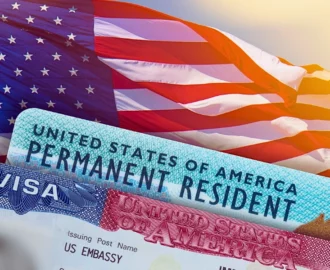If you are seeking legal citizenship in the U.S. it’s important to know how to become a U.S. citizen. To gain U.S. citizenship, you must meet certain requirements and take steps to apply during the naturalization process. This process can be difficult to navigate and prepare for, but an attorney can help by preparing the paperwork and ensuring you meet all eligibility requirements.

For assistance from an experienced citizenship attorney in Chicago, call Cho Immigration Law at 312-853-3088 today and schedule a consultation.
What Is a U.S. Citizen?
A U.S. citizen is someone who has earned the status of citizen of the United States, which gives him or her access to rights, protections, and benefits with responsibilities and duties. Immigrants can eventually become U.S. citizens if they meet the necessary eligibility requirements and complete the naturalization process.
Someone can become a U.S. citizen either through birthright or naturalization. Someone has birthright citizenship if he or she was born in the U.S. or to at least one parent with citizenship who has previously lived in the U.S. Meanwhile, naturalized citizens are those who have legal immigrant status under one of the different U.S. visa categories and who qualify to become U.S. citizens.
What Are the Eligibility Requirements for Immigrants?
So, how can an immigrant become a U.S. citizen? To become an American citizen, there are a few key requirements you must meet under U.S. Citizenship & Immigration Service (USCIS).
Specifically, you must:
- Be at least 18 years old at the time of the naturalization process
- Depending on your age, be capable of speaking, writing, and reading fundamental English
- Be in the country in “good faith” and of “good moral character,” with the ability to show that you’re entering the country with well-meaning intentions
In addition, you will need to meet certain residency requirements as an immigrant.
What Are the Current Residency Requirements?
When beginning the naturalization process, immigrants must have lived as lawful permanent residents (LPRs) for the immediately preceding three years in the USCIS district or U.S. state where they intend to apply, and they must have lived in the U.S. for at least five years. However, individuals who have served in the military may be able to qualify for exceptions.
In addition to official mainland and island states in the U.S., qualifying immigrants may be from other U.S. territories, such as Guam, Puerto Rico, the U.S. Virgin Islands, the District of Columbia, or the Commonwealth of the Northern Mariana Islands.
If you meet these residency requirements, you may begin the path to citizenship for legal permanent residents.
Steps to Becoming a U.S. Citizen
Once you meet all the eligibility requirements, it’s important to know how an immigrant becomes a U.S. citizen to begin the naturalization process with USCIS.
The following are the main steps you’ll need to take to gain citizenship:
1. Confirm That You Are an LPR
You must be a lawful permanent resident at the time of applying for citizenship. If you currently have this status, you may be able to proceed with the naturalization process.
Conversely, if you aren’t an LPR, you may be able to apply for naturalization if you are the spouse or child of a U.S. citizen, or if you are a veteran or active service member of the American military.
2. Live Legally in the U.S. for a 5-Year Minimum
Additionally, if you are an LPR at the time of applying, you will need to meet the residency requirements before becoming a citizen. These requirements include living in the U.S. for at least five years before applying, including three consecutive years of residency in the U.S. territory where you intend to become a citizen immediately prior to applying.
3. Complete Form N-400
The next step will entail preparing Form N-400, Application for Naturalization. Like other USCIS forms, the USCIS website makes it easy to access Form N-400 online.
In addition to the form itself, you will need to provide supporting documentation to help your application.
The different types of documentation may include:
- Passport-quality photos of the applicant
- Birth certificates
- Marriage certificates
- Financial documentation
- Certifications of military service
If you’re not sure which documentation you’ll need as you learn how to become a U.S. citizen, consider speaking with a citizenship lawyer for assistance. A reliable attorney could indicate which documents you will need to collect, complete, and submit, helping ensure all information is accurate and updated when filing Form N-400. He or she can also inform you on how to apply for U.S. citizenship across the entire process. You will also need to pay designated fees to USCIS when filing Form N-400.
4. Submit Biometrics if Needed
In some cases, USCIS might require biometrics, including fingerprints that help create identification documentation. In these instances, you would need to go to a designated facility at a specific time and date according to USCIS notification.
5. Prepare for Your Interview
Before completing the application process, you will need to attend an interview with a USCIS official. This immigration officer will ask you a series of questions to determine why you wish to gain citizenship, your eligibility, your criminal background, and more.
Following the interview, USCIS may also require you to take a naturalization test that gauges your knowledge of relevant topics, including your ability to understand and communicate in English and your general knowledge of the U.S. Constitution and American history.
Again, if you need assistance with the interview process and preparation, an attorney can indicate what to expect. He or she can walk you through the kinds of questions that the immigration officer is likely to ask, helping you rehearse your answers.
6. Await a Decision
After completing your interview, you will need to wait for USCIS to either approve or deny your application for naturalization. In some cases, USCIS might notify you to request additional supporting documentation and evidence before making a final decision. The notice from USCIS will come via mail.
7. Take the U.S. Oath of Allegiance
If USCIS approves your application, the agency will send you a notice to take the Oath of Allegiance to the U.S. This pledge will occur during your naturalization ceremony, which could take place during the same day as your interview if USCIS already approved Form N-400 ahead of the interview.
What Are the Rights and Responsibilities of U.S. Citizens?
Nearly a million immigrants undergo naturalization every year in the U.S., with the country welcoming 878,500 naturalized citizens in 2023 alone. When you become a U.S. citizen, there are rights and responsibilities you will have.
These rights and duties include:
Voting
The majority of U.S. citizens can vote in local, state, and federal elections to influence political offices. However, some citizens may not be able to vote, including those under the age of 18 or, in some states, with a felony conviction.
Freedoms
Under the U.S. Bill of Rights, U.S. citizens have certain inalienable rights in accordance with the 10 amendments. These rights include freedom of speech, freedom of religion, freedom of expression, and the right to a fair trial before a conviction.
Paying Taxes
U.S. citizens have the responsibility of paying state and federal taxes, which helps fund various programs and benefits in the country, from public facilities to public assistance programs.
Respecting Others’ Rights
You must also respect other citizens’ rights in adherence to the U.S. Constitution and all relevant laws.
Performing Military Service
Citizens may also join a branch of the U.S. military or naval services at the age of 18 or older.
How to Become a U.S. Citizen With the Help of an Attorney
If you’re not entirely sure how to become a U.S. citizen and need assistance with the entire process, a Chicago citizenship attorney can represent you during naturalization.
An attorney will work closely with you to determine whether you meet all eligibility requirements for naturalization, prepare all documentation, help you prepare answers for your interview, and facilitate a generally smooth naturalization process.
In addition, an attorney could represent you in other immigration-related cases. For instance, if USCIS denies your application for erroneous reasons, your lawyer could help prove that the USCIS acted in error and have the agency reverse its decision. You could also get representation when facing immigration issues, including removal and deportation.
If you’re not familiar with the naturalization process and what it entails, you could ultimately benefit from the reliable guidance of an experienced immigration attorney. The key is finding the ideal attorney to represent you and provide dependable representation.
To learn more about how our attorneys can help you during naturalization and other immigration processes, contact us at Cho Immigration Law to schedule an immigration lawyer consultation.




